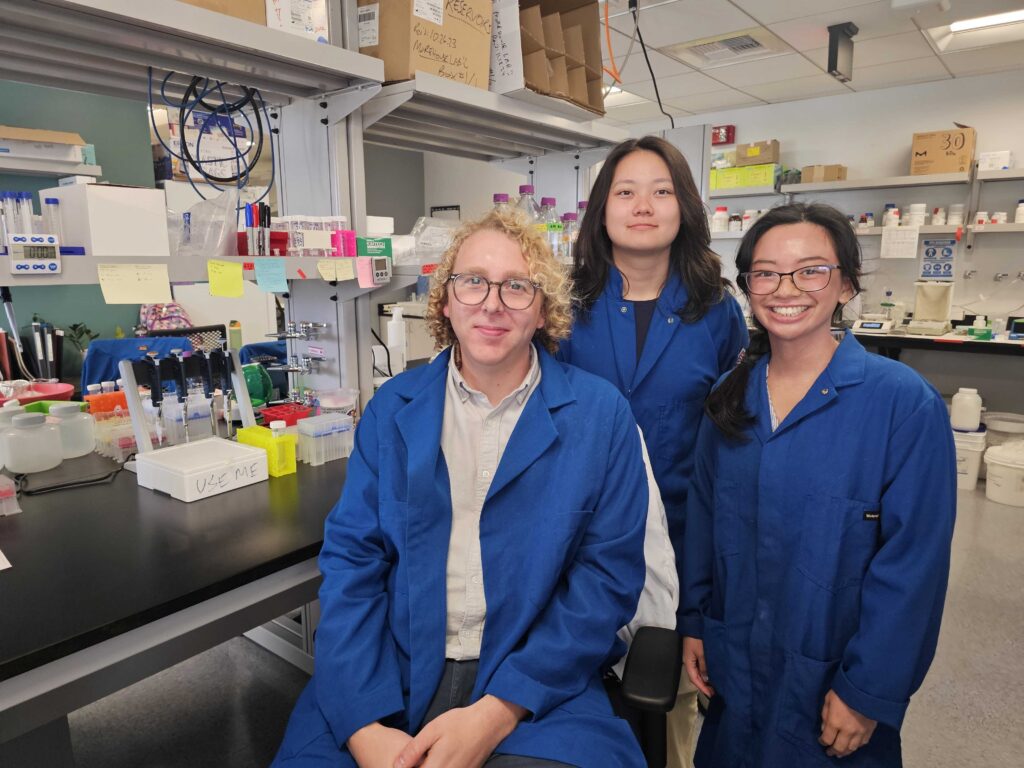
Irvine, Calif., August 6, 2025 — In a new study published in Science, researchers from the Charlie Dunlop School of Biological Sciences at UC Irvine, in collaboration with scientists at Institut Curie, Institut Pasteur and other international partners, have identified a previously unknown component of the human immune system that shares surprising similarities with immune defenses found in bacteria.
For decades, scientists have believed that many of our immune system’s tools were uniquely human or, at the very least, specific to animals. But this new research reveals that a protein humans possess, long overlooked, actually shares deep evolutionary roots with bacterial proteins used to fight off viruses.
This discovery centers on a protein called SIRal, found in humans and other vertebrates. SIRal is part of a larger family of proteins that researchers believe spans billions of years of evolution. Until now, SIRal’s role was a mystery, but scientists have now shown that it plays a vital part in how our immune system detects and responds to infection.
“This research highlights the surprising conservation of immunity across branches of the tree of life,” said Assistant Professor Benjamin Morehouse, one of the senior authors on the study. “It also reveals that there is still so much we have left to learn about how our immune system functions.”
The team used a powerful combination of genetic analysis, immune cell experiments and biochemical testing to trace the ancestry and function of SIRal. Their work revealed that SIRal helps activate the body’s frontline immune response, specifically through a key pathway known as the Toll-like receptor (TLR) system. This system helps the body recognize invaders like viruses and bacteria and then triggers an inflammatory response to fight them off.
To prove SIRal’s role, researchers showed that immune cells lacking this protein were significantly less effective at fighting off infections from pathogens like herpes simplex virus and Salmonella. In other words, without SIRal, part of the body’s immune alarm system is muted.
Getting to this point wasn’t easy. “We were extremely lucky to find that several of the proteins we tested had detectable enzymatic activity,” said Professor Morehouse. “I credit our success to the hard work and determination of graduate student Eirene Marie Ednacot and undergraduate Anny Wang. They spent countless hours optimizing the conditions for detecting this activity.”
One of the most remarkable aspects of this discovery is that the immune-related function of SIRal appears to be connected to its ability to degrade a molecule called NAD+, a key compound involved in cellular energy. This same mechanism is used by bacterial immune proteins, suggesting that this defensive strategy has been preserved across billions of years of evolution.
The implications of this research are vast. SIRal could be a new target for developing drugs that boost immune function or treat autoimmune diseases and even cancer. But before those therapies become reality, more research is needed to understand how exactly SIRal is turned on during an infection and how its actions are regulated inside human cells.
“Our team is particularly interested in understanding the biochemical mechanisms underlying how SIRal works,” said Morehouse. “Once we have these pieces of information in hand, the hope is that we can leverage our understanding to develop small molecule drugs that target SIRal for therapeutic benefit.”
This study marks a major step in shifting how we understand immunity — not as something that evolved entirely from scratch in humans, but as a collection of ancient tools, refined and repurposed over time. It also demonstrates the power of looking beyond traditional scientific boundaries to find answers to today’s medical challenges.
As the pace of discovery accelerates, this work is a powerful reminder of the profound value of scientific research. By exploring the unknown and asking fundamental questions about how life works, scientists uncover insights that can transform our understanding of human health. Breakthroughs like this are only possible through sustained investment in basic science — research that may not promise immediate applications but lays the critical groundwork for tomorrow’s medical advances.
About the University of California, Irvine Charlie Dunlop School of Biological Sciences:
Recognized for its pioneering research and academic excellence, the Charlie Dunlop School of Biological Sciences plays a crucial role in the university’s status among the nation’s top 10 public universities, as ranked by U.S. News & World Report. It offers a broad spectrum of degree programs in the biological sciences, fostering innovation and preparing students for leadership in research, education, medicine and industry. Nestled in a globally acclaimed and economically vibrant community, the school contributes to the university’s impact as Orange County’s largest employer and a significant economic contributor. Through its commitment to exploring life’s complexities, the Dunlop School embodies the UC Irvine legacy of innovation and societal impact. For more on the Charlie Dunlop School of Biological Sciences, visit https://www.bio.uci.edu/.
